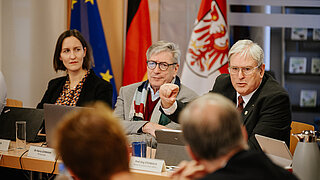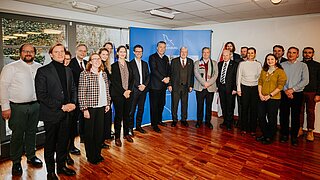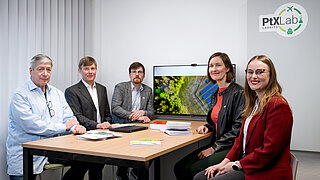PtX Lab Lausitz addresses Lusatia as a transformation region in Brussels
Copyright: PtX Lab Lausitz, Toni Kretschmer
Lusatian centre of expertise, together with the Ministry for Economic Affairs, Labour and Energy (MWAE) of the State of Brandenburg, is examining the current situation of power-to-liquid production in Germany and Europe.
As the European aviation industry seeks ways to drastically reduce its emissions, hydrogen-based green technologies are emerging as a key solution for climate-neutral flying. In particular, electricity-based Sustainable Aviation Fuels (eSAF) offer the prospect of replacing fossil fuels in aviation. However, their market ramp-up faces significant challenges.
Unlocking the industrial potential of transition regions
Brandenburg is considered a pioneer in the development of an industry for hydrogen technologies and is an example of how regions affected by structural change can exploit new opportunities. This was demonstrated at the event ‘eSAF: Unlocking the Industrial Potential of Regions in Transition’ in Brussels. Experts from science and politics accepted the invitation of the Brandenburg Ministry for Economic Affairs, Labour and Energy (MWAE) and the PtX Lab Lausitz to the Belgian capital at the end of November. At the Representation of the State of Brandenburg in Brussels, they discussed the current state of power-to-liquid (PtL) production in Europe and the specific role of the state of Brandenburg as a pioneer in the climate-neutral transformation of aviation.
Climate-neutral flying requires regulatory and technical measures
At the start of the symposium, Prof. Dr.-Ing. Jörg Steinbach, Minister for Economic Affairs, Labour and Energy of the State of Brandenburg, spoke out in favour of Power-to-X (PtX) technologies: ‘Brandenburg can become a pioneering region for the hydrogen economy.’ Steinbach emphasised the importance of implementing the course set by the European Union (EU) in cooperation with industry, politics and science in Germany as well, particularly in the structural change regions.

Copyright: PtX Lab Lausitz, Toni Kretschmer
Brandenburg can become a pioneering region for the hydrogen economy.
Dr. Harry Lehmann, head of PtX Lab Lausitz, who had invited the Brandenburg state representatives in Brussels on behalf of the Cottbus competence centre, explained that a reduction in air traffic and increases in efficiency through technical innovations will not be enough to transform the aviation sector. ‘To achieve the international climate protection targets, massive CO2 savings are needed,’ emphasised Lehmann.

Copyright: PtX Lab Lausitz, Toni Kretschmer
What regulatory obstacles exist in the market ramp-up of synthetic aviation fuels? How can it be ensured that industrial transformation regions benefit from the development of new technologies, especially with regard to their industrial base? These and other questions were the focus of the event. The guests from EU politics, business and associations discussed possible recommendations for action and solutions for the development of a sustainable future for the aviation industry. The experts agreed on one point: climate-neutral flying requires joint action. Regulatory frameworks must be aligned with science and industry.
Contact
Dr
Harry Lehmann
Head of PtX Lab Lausitz
+49 151 40 171 692
Write E-Mail
more information

